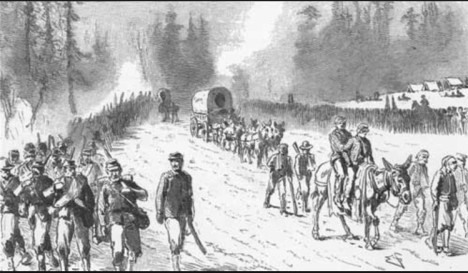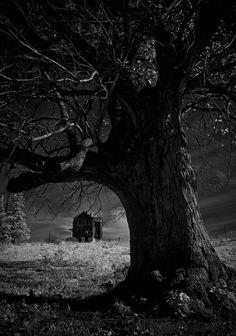Previous Post: Exchange and Return Home
.
Little Doctor on the Black Horse
Return to the Army
by Harriott Benedict Wickham Barton
.
In March of 1864, David had rejoined his regiment near Ringgold, Georgia, and the routine of the previous year began. He was to remain in this vicinity for many months, and it was here that he was known to the people as “The Little Doctor on the Black Horse.”
Smallpox had recently been added to the ever present dysentery and ague (similar to malaria). The soldier victims of smallpox were isolated away from the camps in “The Shanty” and David was assigned to care for them, going out each day from camp to care for them. He also, at the same time, continued his service to the local country folk, vaccinating all who asked for it.
“March 24/’64 – Ringgold, Ga., Dear Hattie, I am now detailed to the smallpox hospital. If not relieved, I shall be here a month or more. I wish you could send me some onion and radish seed. I mean to have a little garden out there. As soon as the roads are settled, I think there will be an advance, but am afraid I shall not be with it, as I shall be left with my patients. I suppose that will please you, but not me! My horse has gone lame for some unknown reason. I have promised to stay tonight with Mr. Brown, a prosperous farmer, whose daughter-in-law is expecting a baby right away. They want me to stay, and I shall, for it will be very handy while my horse is lame, saves a walk of 4 miles every day back to camp.”

May 8/64 – “My regiment has moved on and left me. I have now only 3 cases of smallpox in the “shanty.” The whole army is moving south, 500 wagons today, 1,100 tomorrow. Even the woods are white with dust. It is said we have the biggest army ever seen in these parts, 100,000 men. I wish I were with them. I want to be in the front rank when we go into Atlanta.”
“May 29/64 – The army has got so far off now that we here don’t know what is going on. I feel ashamed to stay here with so few patients when I must be needed elsewhere. But orders are orders. I have many local patients around here, especially children. Dysentery is very bad. I am afraid Mr. Brown’s little grandson is going to die of it. Such a nice little boy. The flies are so bad.”
 “June 2/64 – Day before yesterday, Mr. Brown’s little grandson died. I sat up with him all night before he died, giving his medicine. He would open his mouth for it just like little birds do when their mother feeds them. He was a year old. Yesterday, I went to the funeral about 5 miles, to a little place called Graysville. As I watched at his side that night, I thought of my own little ones at home and wondered if they were still alive and well. The graveyard was a desolate place out in the woods. Many of the graves were entirely obliterated. All the pens around the individual graves had been destroyed by fire. I thought of the lines, which you will remember, ‘it matters not. I’ve oft been told, where the body lies when the heart is cold.’ The flies fill my face and eyes so I can hardly see to write. My horse is entirely well now and I ride him around most of the time. Keep him on Mr. Brown’s clover.” (On several occasions, after he had gone on to the army, David writes of receiving letters from various of the Brown’s).
“June 2/64 – Day before yesterday, Mr. Brown’s little grandson died. I sat up with him all night before he died, giving his medicine. He would open his mouth for it just like little birds do when their mother feeds them. He was a year old. Yesterday, I went to the funeral about 5 miles, to a little place called Graysville. As I watched at his side that night, I thought of my own little ones at home and wondered if they were still alive and well. The graveyard was a desolate place out in the woods. Many of the graves were entirely obliterated. All the pens around the individual graves had been destroyed by fire. I thought of the lines, which you will remember, ‘it matters not. I’ve oft been told, where the body lies when the heart is cold.’ The flies fill my face and eyes so I can hardly see to write. My horse is entirely well now and I ride him around most of the time. Keep him on Mr. Brown’s clover.” (On several occasions, after he had gone on to the army, David writes of receiving letters from various of the Brown’s).
GO TO NEXT POST – Battle for Atlanta –
 About the Author: Harriott Benedict Wickham Barton (1890-1981) was born in Norwalk, Ohio to Frank and Agnes Wickham. Her father was the youngest of twelve children of Frederick and Lucy Wickham, early settlers of the Firelands, and her mother was the great-great granddaughter of Platt and Sarah Benedict, who founded the city of Norwalk. Educated at Norwalk High School and Wooster College, she became a teacher. She marched as a suffragette and worked for the Labor Department during World War I. After the war, she went west to teach school, and became one of the last homesteaders, proving up a property near Wheatland, Wyoming. She married Angus Barton in 1924 and they raised four children on the homestead through the Dust Bowl and World War II. In the late 1940s, she and her Angus moved to Ohio, where they spent the rest of their lives. During the 1950s and ‘60s, she wrote “Little Doctor on the Black Horse,” poetry, and short stories, some which were published in various journals and magazines.
About the Author: Harriott Benedict Wickham Barton (1890-1981) was born in Norwalk, Ohio to Frank and Agnes Wickham. Her father was the youngest of twelve children of Frederick and Lucy Wickham, early settlers of the Firelands, and her mother was the great-great granddaughter of Platt and Sarah Benedict, who founded the city of Norwalk. Educated at Norwalk High School and Wooster College, she became a teacher. She marched as a suffragette and worked for the Labor Department during World War I. After the war, she went west to teach school, and became one of the last homesteaders, proving up a property near Wheatland, Wyoming. She married Angus Barton in 1924 and they raised four children on the homestead through the Dust Bowl and World War II. In the late 1940s, she and her Angus moved to Ohio, where they spent the rest of their lives. During the 1950s and ‘60s, she wrote “Little Doctor on the Black Horse,” poetry, and short stories, some which were published in various journals and magazines.
Thanks for visiting! Share and like this post below, and on Facebook. Let me know what you think in the comments. I’d love to hear from you!
© 1961 by Harriott Benedict Wickham Barton. All rights reserved.
Filed under: Civil War | Tagged: Civil War, David DeForest Benedict |


Leave a comment